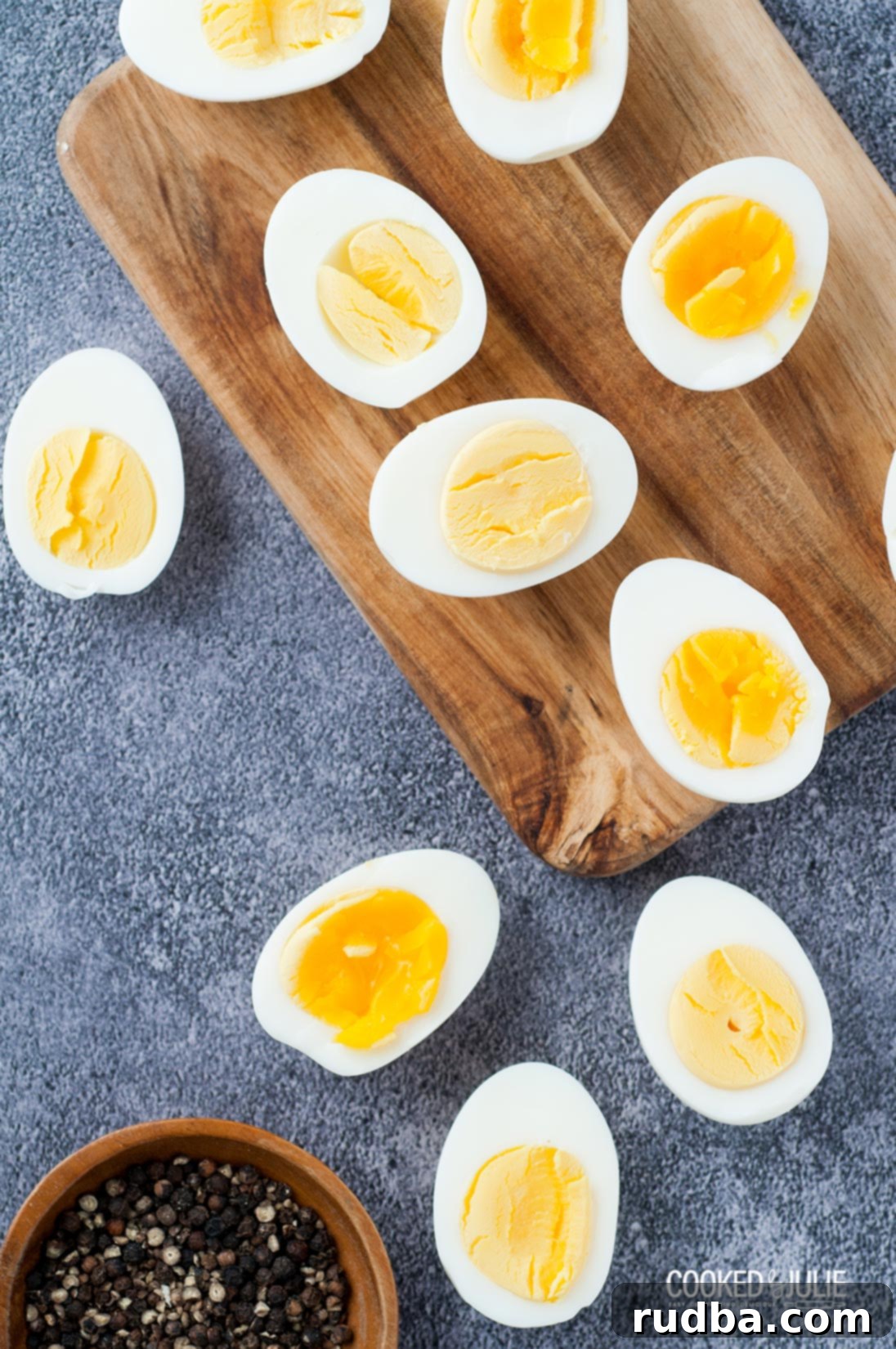Mastering Boiled Eggs: Your Ultimate Guide to Perfect Soft, Medium, & Hard-Boiled Eggs Every Time
Boiled eggs are a true kitchen staple – a versatile, high-protein, and low-carb food perfect for any meal or snack. Whether you crave a creamy, runny yolk or a firm, fully cooked center, mastering the art of boiling eggs is simpler than you think. This comprehensive tutorial will guide you through cooking the perfect egg, every single time!
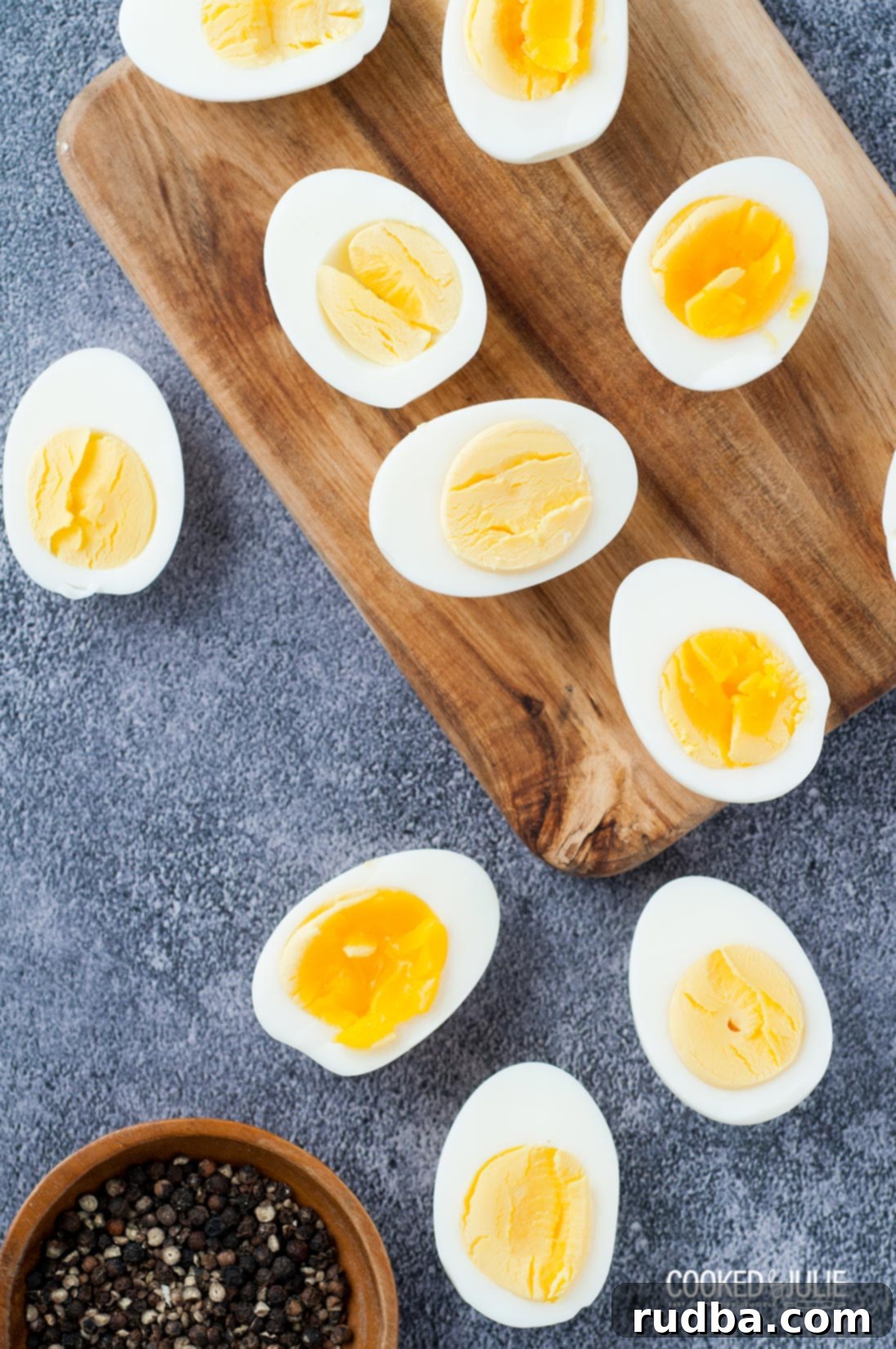
Cooking eggs to perfection might seem like a straightforward task, yet it’s one that often leaves home cooks wondering, “How do I boil eggs just right?” From a delicate soft-boiled egg with a liquid gold yolk to a robust hard-boiled egg ideal for salads and deviled eggs, achieving your desired consistency requires a bit of precision. Without a reliable method and a timer, it’s incredibly easy to undercook or overcook eggs, leading to disappointment. But worry not, because with this simple guide, you’ll be able to consistently create perfectly cooked eggs, ready to be enjoyed on their own or in fantastic recipes like Classic Deviled Eggs.
Beyond their culinary versatility, eggs offer a powerhouse of nutrition. They are an excellent source of high-quality protein, essential vitamins (like B12, D, and A), and minerals (like selenium and iron). Their low-carb profile makes them a favorite for various dietary preferences, including keto and paleo. Including boiled eggs in your diet is an effortless way to boost your nutrient intake, providing sustained energy and satiety throughout the day. Whether for breakfast, lunch, or a quick snack, eggs are a wholesome and satisfying choice.
Essential Tools for Boiling Eggs
To embark on your journey to perfect boiled eggs, you’ll need just a few basic items readily available in any kitchen:
- Fresh Eggs: While older eggs are often recommended for easier peeling, perfectly boiled eggs can be achieved with any fresh eggs.
- A Saucepan: Choose a saucepan large enough to comfortably hold your eggs in a single layer without crowding. This ensures even cooking.
- A Bowl Filled with Ice Water: This ice bath is a critical step for immediately stopping the cooking process and making the eggs much easier to peel.
Boiling Egg Times: Achieving Your Desired Consistency
The cooking time for your eggs is entirely a matter of personal preference. Different recipes and tastes call for different textures, ranging from a barely set white with a runny yolk to a completely firm and creamy center. Follow these precise instructions to achieve your desired results and customize your boiled eggs:
- For Soft-Boiled Eggs (4-5 minutes): Cook for 4 to 5 minutes. The egg whites will be just set but still delicate, while the yolk will remain wonderfully warm and runny – perfect for dipping toast!
- For Medium-Boiled Eggs (6-8 minutes): Cook for 6 to 8 minutes. This range delivers a creamy, custardy yolk that is mostly set but still has a slightly jammy center. The whites will be firm. This is often considered the ‘just right’ sweet spot by many.
- For Firm Hard-Boiled Eggs (9-14 minutes): Cook for anywhere between 9 to 14 minutes to reach your preferred firm yolk consistency. At 9-10 minutes, the yolk will be fully set and creamy yellow. For a completely firm, crumbly yolk, cook for 12-14 minutes. The whites will be very firm throughout.
Remember that factors like egg size (larger eggs may need an extra minute) and altitude can slightly affect cooking times. Always use a timer for accuracy!
You can use the chart below as a visual guide to help you decide how long to boil your eggs. The numbers above the eggs correspond to the cooking times for each texture, illustrating the progression from a soft, runny yolk to a firm, fully cooked one.
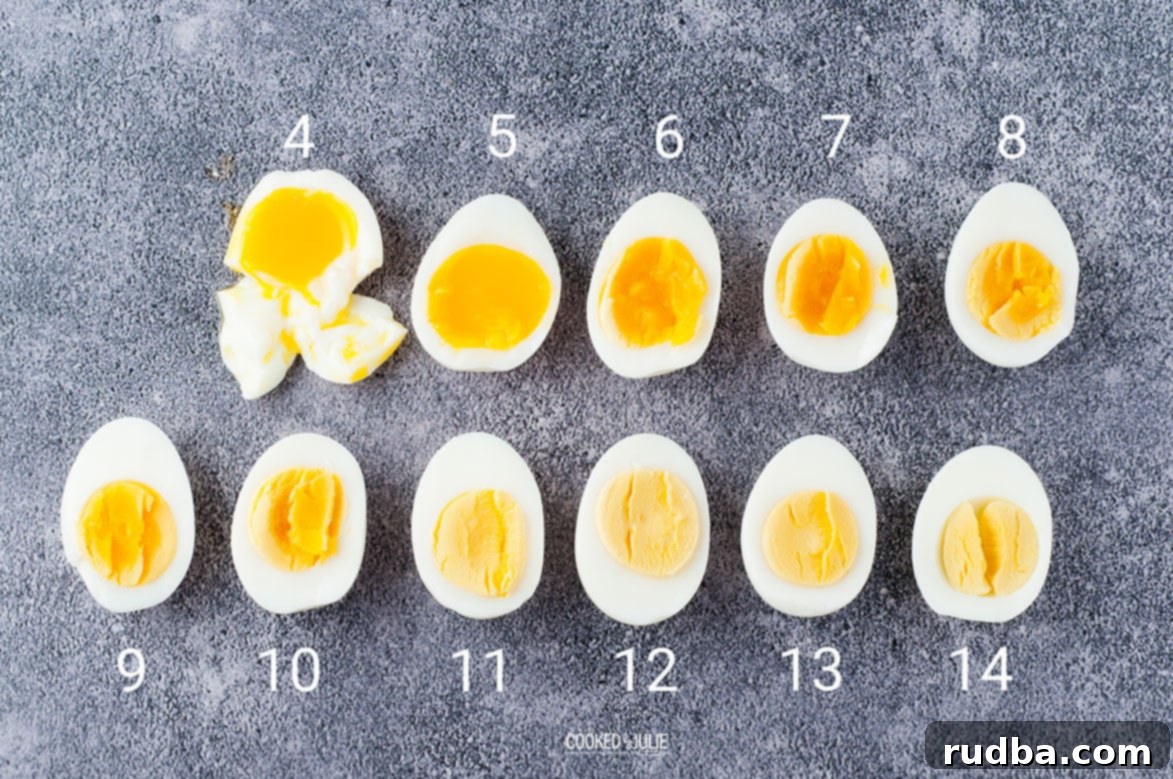
The Ultimate Method for Perfectly Boiled Eggs
Achieving consistently perfect boiled eggs is incredibly simple if you follow this foolproof method. The key to success lies in a few crucial steps:
The most important thing to remember is this: Always start your eggs in cold water. This ensures even cooking from the outside in and helps prevent the shells from cracking during the boiling process.
- Arrange Eggs in a Saucepan: Carefully place your eggs in a single layer at the bottom of a saucepan. Avoid crowding them.
- Cover with Cold Water: Add enough cold water to the saucepan to cover the eggs by at least an inch.
- Bring to a Rolling Boil: Place the saucepan on your stove and turn the burner to high heat. Bring the water to a rapid, rolling boil.
- Cook for Desired Time: Once a rolling boil is reached, start your timer immediately. Cook for your desired amount of time (e.g., 4 minutes for soft-boiled, 6-8 minutes for medium, 9-14 minutes for firm hard-boiled).
- Immediately Shock in Ice Water: As soon as the timer goes off, remove the saucepan from the heat. Using a slotted spoon, carefully transfer the cooked eggs directly into the prepared bowl of ice water. Let them sit in the ice bath for at least 5-10 minutes. This “shocking” process instantly stops the cooking, preventing overcooking, and helps the egg whites contract, making the shells much easier to peel.
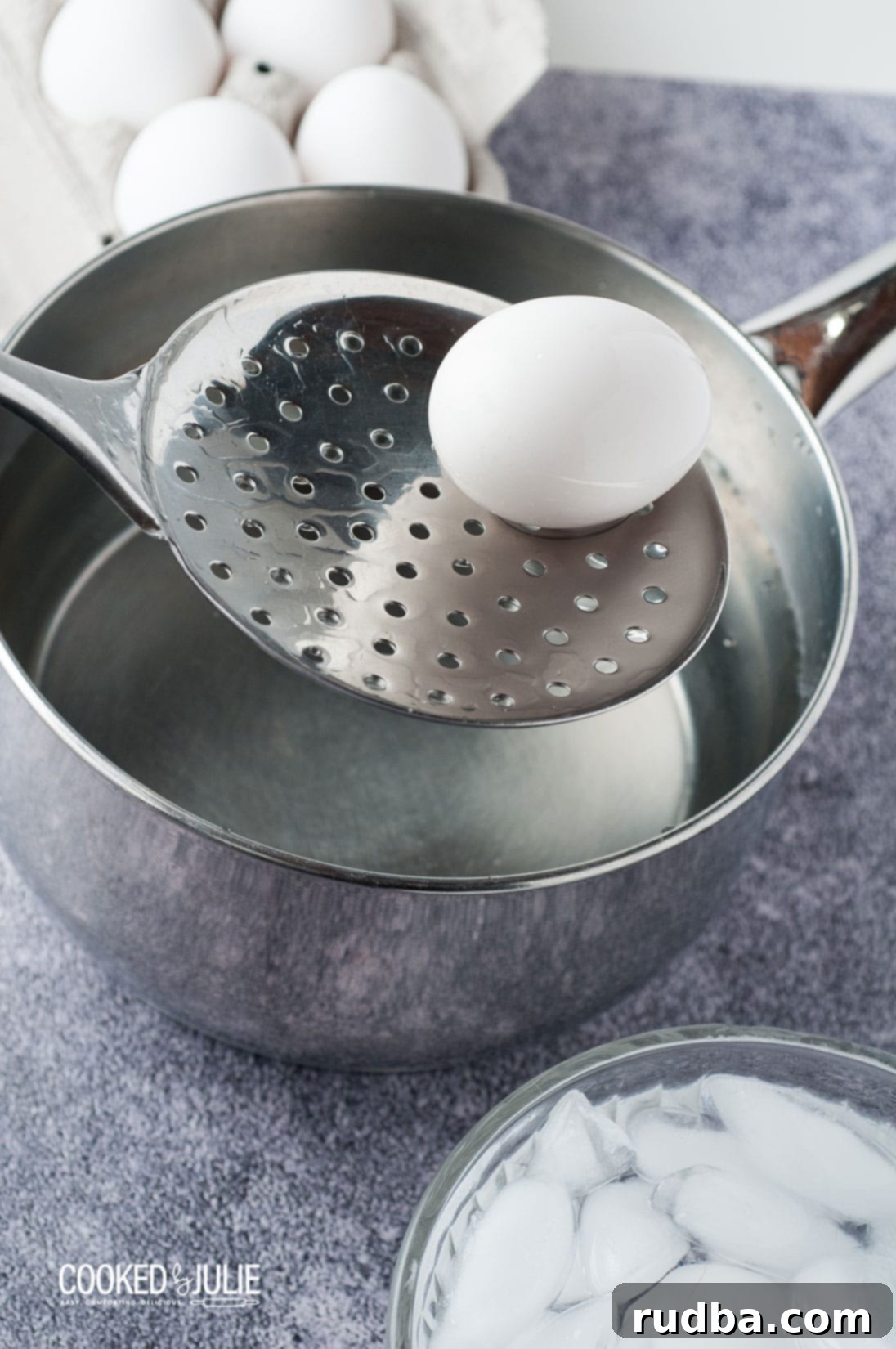
Effortless Peeling: Your Guide to Smooth Hard-Boiled Eggs
One of the most common frustrations with hard-boiled eggs is difficult peeling. Following the ice bath step makes a significant difference. Here’s how to peel them like a pro:
- Cool Completely: Ensure your eggs have cooled completely in the ice bath. This step is crucial for easy peeling.
- Gentle Tap to Crack: Take an egg and gently tap it on a cutting board or a hard, flat surface to create a few initial cracks on the shell.
- Roll and Crack: Using gentle but firm pressure, roll the egg between your palms or on the flat surface to crack the shell all around. This loosens the shell from the membrane underneath.
- Peel Under Water (Optional but Recommended): For the easiest peeling, start peeling under a stream of cold running water, or in a bowl of water. The water helps get under the membrane, separating it from the egg white.
- Discard Shells: Peel the shell pieces off using your fingers and discard them. Rinse the peeled egg under cold water one last time to ensure no tiny shell fragments remain.
Pro Tip for Peeling Eggs: The fresher an egg is, the harder it is to peel when boiled. Eggs that are about 7-10 days old tend to peel the easiest. If you’re struggling, try peeling them under cold running water; the water helps to separate the membrane from the egg white, making the process smoother and cleaner. There’s nothing worse than biting into a delicious egg and finding a piece of crunchy shell!
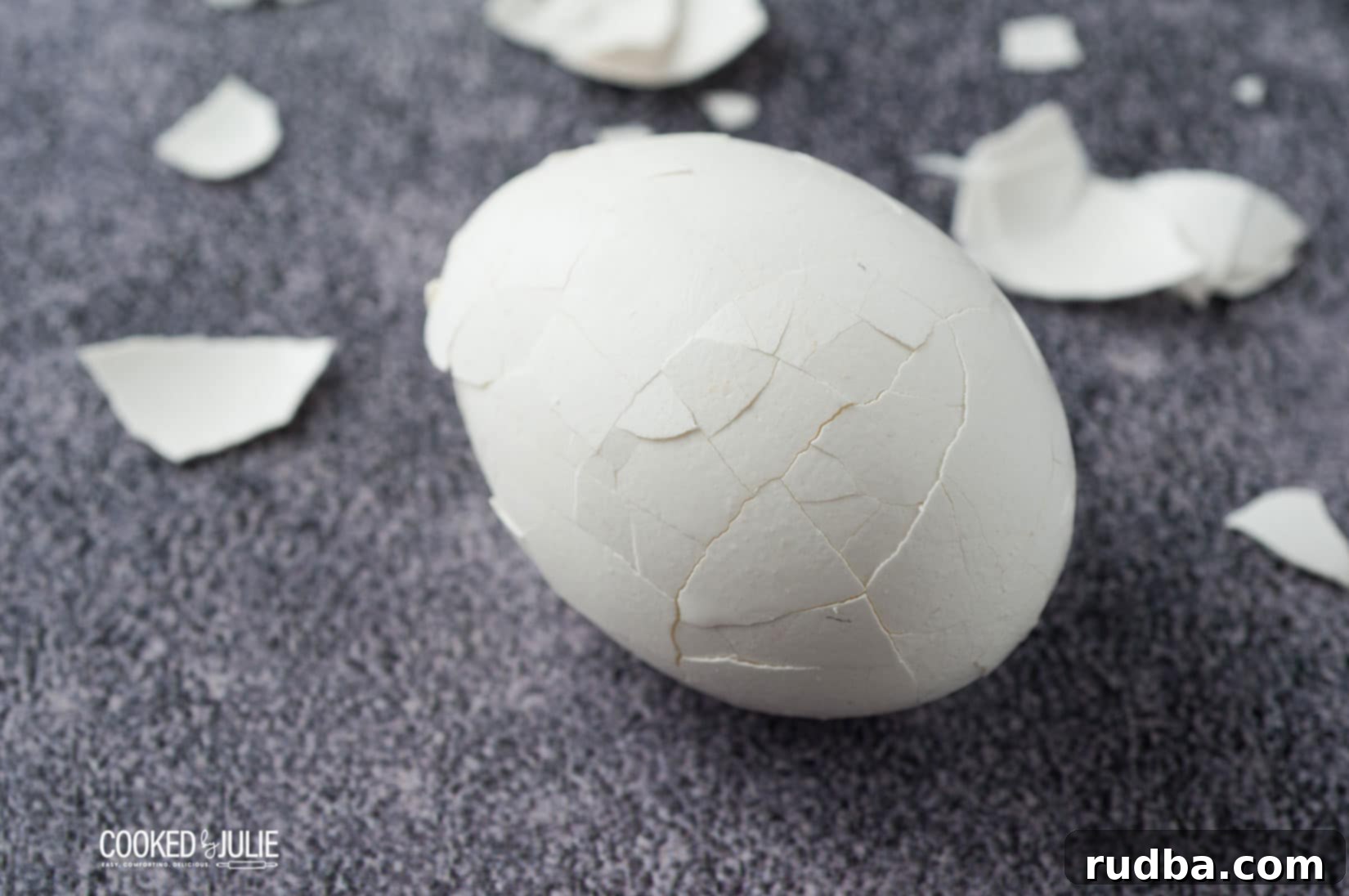
Troubleshooting: The Green Ring Around Your Egg Yolk
Have you ever sliced into a hard-cooked egg only to discover an unsightly green or greyish-green ring around the yolk? This common occurrence is a clear sign that your eggs have been overcooked. The discoloration happens when hydrogen sulfide (from the egg white) reacts with iron (from the yolk) at high temperatures, forming ferrous sulfide. While harmless to eat, it indicates the egg has cooked too long and can affect the texture.
To avoid this, simply consider reducing your cooking time by a minute or two. Aim for that perfect creamy, vibrant yellow yolk consistency by following the timing guidelines provided earlier. The ice bath step also plays a crucial role in preventing this by immediately stopping the cooking process.
Creative Ways to Serve and Enjoy Boiled Eggs
Boiled eggs are incredibly versatile and can be enjoyed in countless ways. Here are some inspiring ideas to incorporate them into your meals, whether soft, medium, or hard-boiled:
- Classic Breakfast Delight: Simply sprinkle a little sea salt and freshly cracked black pepper over your soft or medium-boiled eggs. Serve them with buttered toast for dipping, fresh fruit, and a hot cup of coffee for a delicious and satisfying breakfast.
- Elevate Your Salads: Slice or chop hard-cooked eggs and add them to a vibrant chef salad, a hearty Cobb salad, or a refreshing Niçoise salad for an extra boost of protein and flavor. They also make a fantastic addition to green salads with a simple vinaigrette.
- Healthy & Flavorful Spreads: Mash hard-boiled eggs with avocado, a touch of Greek yogurt or mayonnaise, and seasonings for a quick and easy egg salad sandwich filling or a low-carb Avocado Chicken Salad.
- Perfect Pre- or Post-Workout Snack: Enjoy hard-cooked eggs alongside a handful of nuts, crunchy veggies like carrot sticks or bell pepper slices, or a piece of cheese for a fantastic high-protein, energy-boosting snack that keeps you full and fueled.
- Meal Prep Powerhouse: Hard-boiled eggs are ideal for meal prepping. Make a batch at the beginning of the week to quickly grab for breakfast, lunch additions, or healthy snacks on the go.
- Global Cuisine Toppings: Add sliced or halved boiled eggs to ramen bowls, curries, or even a savory oatmeal for a rich, creamy, and protein-packed addition.
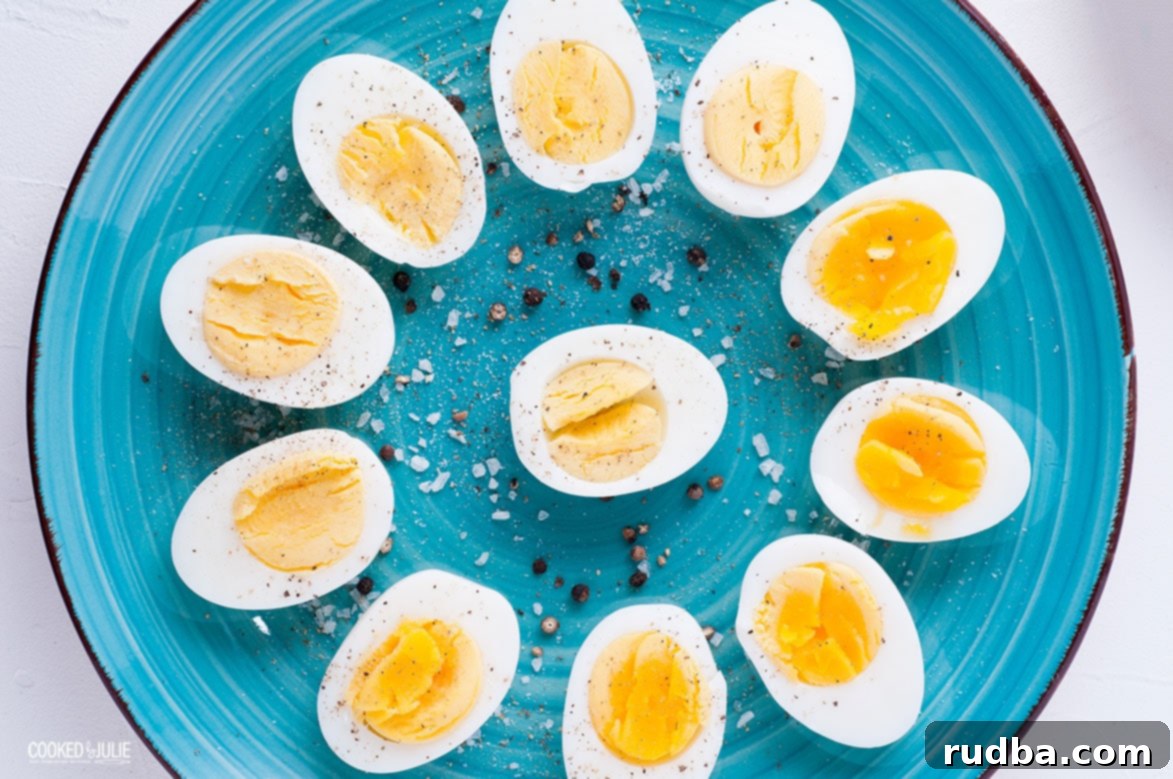
Looking for more delicious ways to use boiled eggs in your cooking? Try these fantastic recipes!
- Deviled Egg Pasta Salad
- Shrimp Cobb Salad
- Easy Turkey Meatloaf
- Hawaiian Macaroni Salad
- Potato and Egg Salad
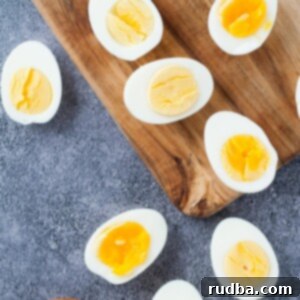
How to Boil Eggs
Save RecipeSaved Recipe
Pin Recipe
Rate Recipe
Print Recipe
Ingredients
- 12 Large Eggs
- Cold water (to cover eggs by 1 inch)
- Ice water (for ice bath)
- Salt & Pepper for garnish, optional
Instructions
-
Carefully place your eggs in a large saucepan, ensuring they are in a single layer. Fill the saucepan with cold water until the eggs are completely covered by at least one inch of water.
-
Place the saucepan on the stove over high heat and bring the water to a rapid, rolling boil.
-
Once boiling, set a timer and cook the eggs for your desired texture: 4-5 minutes for soft-boiled, 6-8 minutes for medium-boiled, or 9-14 minutes for firm hard-boiled.
-
Immediately after the cooking time is up, remove the saucepan from the heat. Transfer the eggs using a slotted spoon into a prepared bowl of ice water. Let them cool in the ice bath for at least 5-10 minutes.
-
Once cooled, gently tap each egg on a hard surface to crack the shell, then roll it with gentle but firm pressure to create more cracks all around.
-
Peel off the cracked egg shell pieces. For easier peeling, you can do this under a stream of cold running water. Rinse the peeled eggs with cold water to ensure no shell fragments remain.
-
Serve immediately topped with salt and pepper if desired, or slice/chop and use them in your favorite recipes.
-
Enjoy your perfectly boiled eggs!
Notes
The Ice Bath is Key: Shocking cooked eggs in ice water immediately halts the cooking process, preventing overcooking, and also makes them significantly easier to peel.
Avoiding the Green Ring: If you notice a green-grey ring around your yolks, it means your eggs have been overcooked. Reduce the cooking time slightly to achieve a beautiful, vibrant yellow yolk consistency.
Nutrition
Nutrition information is automatically calculated, so should only be used as an approximation.
Additional Info
Like this recipe? Leave a comment below!
